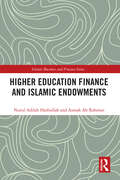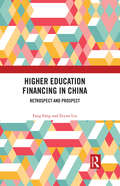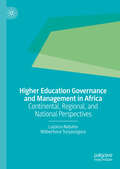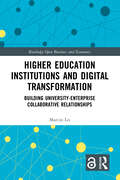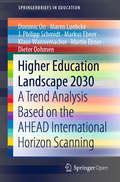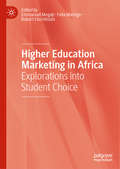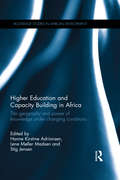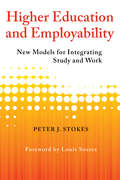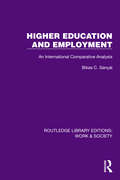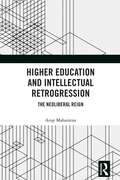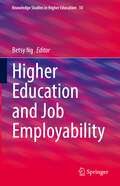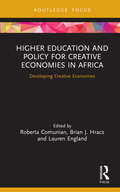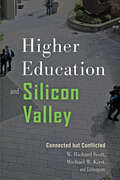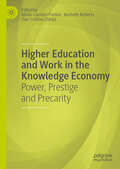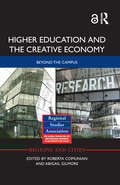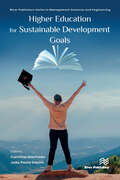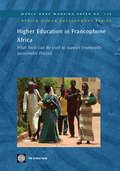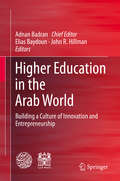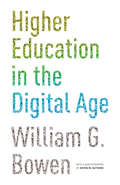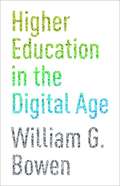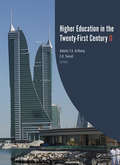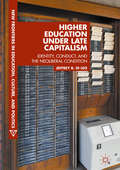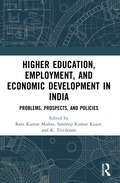- Table View
- List View
Higher Education Finance and Islamic Endowments (Islamic Business and Finance Series)
by Nurul Adilah Hasbullah Asmak Ab RahmanPublic debt pressures due to the global economic crisis in several countries have impacted higher education, compelling governments to curtail the funding of higher education institutions (HEIs). Various instruments have been proposed as a platform for the private sector to channel funding to HEIs. This book introduces readers to the issues surrounding the financing of HEIs, especially public universities, which are dependent on government budgets. It discusses the sources of funding for HEIs, focusing on philanthropic instruments through endowment and waqf funds. Since both forms of income are obtained via contributions from third parties, such as alumni, individuals, business corporations etc., it is essential that they are managed in such a way to ensure their sustainability and that their benefits can be accessed without interruption. It explains the theory of successful endowment and waqf at HEIs, namely appropriate investment planning, superior investment committees, highly skilled investment managers, alumni networks, diversity of income sources and effective fundraising. These elements have been studied empirically in this book through case studies of several selected Malaysian public universities. The book considers policy implications and offers recommendations of strategies that Universities can adopt, such as the appointment of fund managers. No specific guidelines currently exist for appointing fund managers to enable universities to invest in assets such as bonds, equities, and property. Therefore, the book encourages universities to grow the endowment and waqf funds through proper investment strategies executed by professional fund managers. The book contributes new knowledge to scholars, students and researchers, as well as informing university administrators how to collect, manage and invest funds from endowment and waqf.
Higher Education Financing in China: Retrospect and Prospect
by Fang Fang Zeyun LiuBased on theories of economics, sociology, and education, the book aims to explore the role of government and the market in China’s higher education investment. The authors comprehensively overview the characteristics of China's higher education investment system, including government funding, tuition fees, and social donations. In particular, an econometric model has been established to estimate the impact of university investment on the scale of regional higher education and average university student expenditure. Besides, they also make an international comparative analysis of the current changing trend of higher education investment structure and put forward countermeasures and suggestions to improve the government's financial and social investment in higher education. Professional scholars and postgraduate students studying Chinese higher education, the economics of education, and education finance will find this book helpful and inspiring.
Higher Education Governance and Management in Africa: Continental, Regional, and National Perspectives
by Lazarus Nabaho Wilberforce TuryasinguraThe book focuses on higher education governance and management in Africa. It is grounded in the existing studies on governance and management of higher education. It comprises four parts and 15 chapters. The themes in the book can be encapsulated into: (a) the relationship between the state and the university (or the steering models for higher education) in Africa; (b) internal university governance within the framework of the shared governance model, that is, a tripartite arrangement which comprises the corporate governance organ (the university council), the academic governance body (the university senate) and management; (c) internationalization of higher education in Africa; (d) quality assurance of higher education in Africa; (e) the third mission or the public service role of universities in Africa: (f) monitoring and evaluation of higher education; (f) external and internal higher education governance models; (g) and the regulatory agencies for higher education in Africa which has been triggered by the extension of the regulatory state into higher education.
Higher Education Institutions and Digital Transformation: Building University-Enterprise Collaborative Relationships (Routledge Open Business and Economics)
by Marcin LisThe growing complexity, fluidity and instability of the environment as well as changing needs are challenges that both enterprises and higher education institutions must face. Higher education institutions understand that their key product, i.e. knowledge, is a value that can and should be offered to enterprises in a desirable form as a key to innovation and development as well as the basis of the necessary internal transformation to respond to requirements of our times. Attempts to explain the process of collaboration between higher education institutions and businesses based on an institutional perspective fail to capture the complexity of this process. The purpose of this book is to develop a model approach to managerial competencies that affect the innovativeness of enterprises and to identify internal and external key factors strengthening or limiting the impact of managerial competencies on the innovativeness of an enterprise including organizational structure, strategy, organizational culture and more. It will be of value to researchers, academics, and students in the fields of entrepreneurship, innovation, management, strategy, and will be particularly useful to organizations that are aware of their operating conditions in the knowledge-based economy and of the impact of the COVID-19 pandemics on the acceleration of the digital transformation of the contemporary world.
Higher Education Landscape 2030: A Trend Analysis Based on the AHEAD International Horizon Scanning (SpringerBriefs in Education)
by Martin Ebner Dominic Orr Maren Luebcke J. Philipp Schmidt Markus Ebner Klaus Wannemacher Dieter DohmenThis open access Springer Brief provides a systematic analysis of current trends and requirements in the areas of knowledge and competence in the context of the project “(A) Higher Education Digital (AHEAD)—International Horizon Scanning / Trend Analysis on Digital Higher Education.” It examines the latest developments in learning theory, didactics, and digital-education technology in connection with an increasingly digitized higher education landscape. In turn, this analysis forms the basis for envisioning higher education in 2030.Here, four learning pathways are developed to provide a glimpse of higher education in 2030: Tamagotchi, a closed ecosystem that is built around individual students who enter the university soon after secondary education; Jenga, in which universities offer a solid foundation of knowledge to build on in later phases; Lego, where the course of study is not a monolithic unit, but consists of individually combined modules of different sizes; and Transformer, where students have already acquired their own professional identities and life experiences, which they integrate into their studies. In addition, innovative practice cases are presented to illustrate each learning path.
Higher Education Marketing in Africa: Explorations into Student Choice (Routledge Studies In Marketing Ser.)
by Emmanuel Mogaji Felix Maringe Robert Ebo HinsonThis book explores the key players, challenges and policies affecting higher education in Africa. It also explores the marketing strategies and the students’ selection process, providing theoretical and practical insights into education marketing in Africa. In particular, it focuses on the competition for students. The growing number of student enrolments, the public sector’s inability to meet the ever-increasing demands and new private universities springing up mean that it is essential for universities to identify their market and effectively communicate their messages. Although there has been substantial theoretical research to help shed light on students’ choices and universities' marketing strategies, little work has been undertaken on higher education in the African context. Filling that gap in the research, while at the same time acknowledging the regional differences in Africa, this book offers empirical insights into the higher education market across the continent.
Higher Education and Capacity Building in Africa: The geography and power of knowledge under changing conditions (Routledge Studies in African Development)
by Hanne Kirstine Adriansen Lene Møller Madsen Stig JensenHigher education has recently been recognized as a key driver for societal growth in the Global South and capacity building of African universities is now widely included in donor policies. The question is; how do capacity building projects affect African universities, researchers and students? Universities and their scientific knowledges are often seen to have universal qualities; therefore, capacity building may appear straight forward. Higher Education and Capacity Building in Africa contests such universalistic notions. Inspired by ideas about the ‘geography of scientific knowledge’ it explores what role specific places and relationships have in knowledge production, and analyses how cultural experiences are included and excluded in teaching and research. Thus, the different chapters show how what constitutes legitimate scientific knowledge is negotiated and contested. In doing so, the chapters draw on discussions about the hegemony of Western thought in education and knowledge production. The authors’ own experiences with higher education capacity building and knowledge production are discussed and used to contribute to the reflexive turn and rise of auto-ethnography. This book is a valuable resource for researchers and postgraduate students in education, development studies, African studies and human geography, as well as anthropology and history.
Higher Education and Employability: New Models for Integrating Study and Work
by Peter J. Stokes2016 Phillip E. Frandson Award for Literature in the Field of Professional, Continuing, and/or Online Education, University Professional and Continuing Education Association (UPCEA)Higher Education and Employability makes a crucial contribution to the current reassessment of higher education in the United States by focusing on how colleges and universities can collaborate with businesses in order to serve the educational and professional interests of their students. Drawing on his extensive experience with universities and the business world, Peter J. Stokes argues that the need for closer alignment between the two sectors has never been more critical—and that the opportunities for partnership have never been greater. This book includes a series of trenchant case studies of particular universities that have developed ambitious collaborative programs—New York University, Northeastern University, and the Georgia Institute of Technology. Incisive and practical, this book surveys the full range of current partnerships between businesses and higher education and points to opportunities that will best serve students now and in the future.
Higher Education and Employment: An International Comparative Analysis (Routledge Library Editions: Work & Society)
by Bikas C. SanyalOriginally published in 1987, this book focusses on the relationship between higher education and employment and is based on 21 national case studies. The countries discussed are Bangladesh, Benin, Botswana, Egypt, Germany, Malaysia, Pakistan, People's Democratic Republic of Yemen, Philippines, Poland, Sri Lanka, Sudan, Tanzania, the former Union of Soviet Socialist Republics, Zambia, the State of West Bengal (India), Mali, Nepal, France, Indonesia and Peru. It is a unique collection of information, analyses and results which provide the basis for methodological lessons. The synthesis of the case studies has particular relevance as the unemployment or underemployment of higher-education graduates has become a universal issue, challenging all countries whether ‘developing’ or ‘developed’ and irrespective of their political ideology. Now, just as at the time of original publication, the effects of economic stagnation on the one hand, and an unchecked expansion of higher education on the other, are at the centre of the problem. The materials collected in the course of these studies provide a comprehensive data base which allows for some broad conclusions that are generally applicable to the higher-education planning process. The book identifies the determinants of demand for higher education and analyses the transition from higher education to work, as well as the actual mechanisms of the employment system during the latter part of the 20th Century.
Higher Education and Intellectual Retrogression: The Neoliberal Reign
by Arup MaharatnaThis monograph critically analyses the historical evolution of ideas, perceptions and principles on higher education and unravels a few of its interlinked aspects – content, quality, standard, massification, privatization and commercialization. It presents both original and penetrative critique of neoliberal ideas and policies reigning higher education since World War II. The volume argues that with the proliferation of ‘academic capitalism’ the academic quality of higher education has been inevitably compromised and it has thereby heralded a comprehensive ‘intellectual retrogression’. The book offers a meticulous evaluation of global research reflecting on impeccable evidence of decline in academic learning – in its effort, quality, standards and overall intellectual level and rigour. Finally, it illuminates why it is dangerous to continue clinging ideationally to neoliberal reign in education and thereby evading or effacing some of the lasting and universal wisdoms and precepts of the educational reign preceding neoliberal marketoriented predominancy. The book will be of interest to students, teachers and researchers of education, higher education, sociology of education, economics and politics of education. It will also be useful for academicians, higher education administration, policymakers, schoolteachers and those interested in debates and issues around higher education.
Higher Education and Job Employability (Knowledge Studies in Higher Education #10)
by Betsy NgThis book presents the most comprehensive discussion of emerging trends in higher education in the Asia Pacific, ranging from graduate attributes to integrated workplace learning, with an in-depth focus on work readiness, employability and career development. It draws on the relationship between graduate attributes and employability, as well as vocational training or internship programs. It offers theoretical and empirical analyses that institutions, decision-makers or academics can work on together to enhance job employability. This volume will also include issues such as development of emerging and employability skills, as well as directions for the changing nature in real-world settings. The book consists of contributions from experienced international authors, offering detailed insights for those who want a timely understanding of the latest trends in higher education.
Higher Education and Policy for Creative Economies in Africa: Developing Creative Economies (Routledge Contemporary Africa)
by RobertaBrian J.Lauren Comunian Hracs EnglandThe book reflects on the role of the creative economies in a range of African countries (namely Ghana, Kenya, Nigeria, South Africa and Uganda). Chapters explore how creative economies emerge and can be supported in African countries. The contributors focus on two key dimensions: the role of higher education and the role of policy. Firstly, they consider the role of higher education and alternative forms of specialised education to reflect on how the creative aspirations of students (and future creative workers) of these countries are met and developed. Secondly, they explore the role of policy in supporting the agendas of the creative economy, taking also into consideration the potential historical dimension of policy interventions and the impact of a lack of policy frameworks. The book concludes by reflecting on how these two pillars of creative economy development, which are usually taken for granted in studying creative economies in the global north, need to be understood with their own specificity in the context of our selected case studies in Africa. This book will be of interest to students, scholars and professionals researching the creative economies in Africa across the humanities and social sciences. All the royalties from the publication of this book will be donated to the not-for-profit organisation The Craft and Design Institute (CDI) (https://www.thecdi.org.za/) in South Africa, supporting capacity building for young creative practitioners from disadvantaged backgrounds.
Higher Education and Silicon Valley: Connected but Conflicted
by W. Richard Scott Michael W. KirstA data-rich study of the difficult partnerships between the colleges, universities, and businesses of Silicon Valley.Universities and colleges often operate between two worlds: higher education and economic systems. With a mission rooted in research, teaching, and public service, institutions of higher learning are also economic drivers in their regions, under increasing pressure to provide skilled workers to local companies. It is impossible to understand how current developments are affecting colleges without attending to the changes in both the higher education system and in the economic communities in which they exist.W. Richard Scott, Michael W. Kirst, and colleagues focus on the changing relations between colleges and companies in one vibrant economic region: the San Francisco Bay Area. Colleges and tech companies, they argue, have a common interest in knowledge generation and human capital, but they operate in social worlds that substantially differ, making them uneasy partners. Colleges are a part of a long tradition that stresses the importance of precedent, academic values, and liberal education. High-tech companies, by contrast, value innovation and know-how, and they operate under conditions that reward rapid response to changing opportunities. The economy is changing faster than the postsecondary education system.Drawing on quantitative and historical data from 1970 to 2012 as well as 14 case studies of colleges, this book describes a rich and often tense relationship between higher education and the tech industry. It focuses on the ways in which various types of colleges have endeavored—and often failed—to meet the demands of a vibrant economy and concludes with a discussion of current policy recommendations, suggestions for improvements and reforms at the state level, and a proposal to develop a regional body to better align educational and economic development.
Higher Education and Work in the Knowledge Economy: Power, Prestige and Precarity
by Kenneth Roberts Maria-Carmen Pantea Dan-Cristian DabijaIn recent years, the ‘knowledge economy’ has re-entered political discourse as a future-oriented, seductive and optimistic concept. It heralds knowledge and intellectual capability as unlimited and mobile resources of production that can be used for the prosperity of all. Knowledge economy has been linked with the promise of fairness, free from the traditional factors of production, with education as the only prerequisite. This interdisciplinary volume examines the career paths of university graduates, the role of higher education and the internal hierarchies shaping employment in the knowledge economy. The promise of fairness and social inclusivity has not yet played out. Despite increasing numbers of degree holders, the advancements of AI and other technologies is now expected to bring a ‘knowledge substitution’ rather than a human-centred knowledge economy. This book raises questions about the kind of jobs being made available, their social and political implications and how the main sociological themes of gender, class, education, ethnicity, age and location play a role. It will be of great interest to scholars and students of work and employment, higher education, youth studies and knowledge management.
Higher Education and the Creative Economy: Beyond the campus (Regions and Cities)
by Roberta Comunian Abigail GilmoreSince the DCMS Creative Industries Mapping Document highlighted the key role played by creative activities in the UK economy and society, the creative industries agenda has expanded across Europe and internationally. They have the support of local authorities, regional development agencies, research councils, arts and cultural agencies and other sector organisations. Within this framework, higher education institutions have also engaged in the creative agenda, but have struggled to define their role in this growing sphere of activities. Higher Education and the Creative Economy critically engages with the complex interconnections between higher education, geography, cultural policy and the creative economy. This book is organised into four sections which articulate the range of dynamics that can emerge between higher education and the creative economy: partnership and collaboration across Higher Education institutions and the creative and cultural industries; the development of creative human capital; connections between arts schools and local art scenes; and links with broader policy directions and work. While it has a strong UK component, it also includes international perspectives, specifically from Australia, Singapore, Europe and the USA. This authoritative collection challenges the boundaries of creative and cultural industry development by bringing together international experts from a range of subject areas, presenting researchers with a unique multidisciplinary approach to the topic. This edited collection will be of interest to researchers and policy makers working in the area of creative and cultural industries development.
Higher Education and the Creative Economy: Beyond the campus (Regions and Cities)
by Roberta Comunian Abigail GilmoreSince the DCMS Creative Industries Mapping Document highlighted the key role played by creative activities in the UK economy and society, the creative industries agenda has expanded across Europe and internationally. They have the support of local authorities, regional development agencies, research councils, arts and cultural agencies and other sector organisations. Within this framework, higher education institutions have also engaged in the creative agenda, but have struggled to define their role in this growing sphere of activities.Higher Education and the Creative Economycritically engages with the complex interconnections between higher education, geography, cultural policy and the creative economy. This book is organised into four sections which articulate the range of dynamics that can emerge between higher education and the creative economy: partnership and collaboration across Higher Education institutions and the creative and cultural industries; the development of creative human capital; connections between arts schools and local art scenes; and links with broader policy directions and work.Chapter 9 of this book is freely available as a downloadable Open Access PDF at http://www.taylorfrancis.com under a Creative Commons Attribution-Non Commercial-No Derivatives (CC-BY-NC-ND) 3.0 license.
Higher Education for Sustainable Development Goals (River Publishers Series In Management Sciences And Engineering Ser.)
by Carolina MachadoThis book looks to cover the issues related to advances in higher education for sustainable development goals. Nowadays, sustainable development is an important concept in higher education. One of the most widely recognized definitions is based in the Brundtland report as "development that meets the needs of the present without compromising the ability of future generations to meet their own needs." The three core pillars of sustainable development are environment, society and economy. Currently, higher education in the context of sustainable development goals (SDGs) is a great challenge. The information about higher education for sustainable development presents great interest to improve communication between professors, researches and students in universities, institutes, colleges, etc. This research book covers all aspects of higher education for sustainable development goals, namely, no poverty, zero hunger, good health and wellbeing, quality education, gender equality, clean water and sanitation, affordable and clean energy, decent work and economic growth, industry, innovation, and infrastructure, reduced inequalities, sustainable cities and communities, responsible consumption and production, climate action, life below water, life on land, peace, justice and strong institutions and partnerships.
Higher Education in China: Internationalization in Turbulent Times
by William C. Kirby Joycelyn W. EbyThe rapid growth in quantity and quality of universities in China since 1978 is the most recent evolution in a long history of higher education. From as early as the Tang Dynasty, academies existed to prepare scholars for the civil service examination, but by the Republican period, higher learning was dominated by a host of well-regarded, cosmopolitan, comprehensive universities. In 1952, these institutions were reorganized according to the Soviet model, and remained highly specialized until the resurgence of comprehensive institutions after 1978. This background note describes this history and then elaborates on the system of higher education since 2000, focusing on university governance, funding, faculty policy, admissions systems, and internationalization. It concludes by looking at the tightening of ideological control in universities in 2013 and 2014, and reflects on the potential for China to establish "world-class" universities.
Higher Education in Francophone Africa
by Pierre Antoine Gioan Pierre AntoineFor more than a decade, higher education and research in the French-speaking countries of Africa has been in a state of severe crisis, stemming from an increasing disparity between available resources and the requirements vital to providing high-quality education. 'Higher Education in Francophone Africa' seeks to: 1) highlight the factors which have led to the development of this situation in most countries; 2) identify the conditions for creating a framework for regulating financially-sustainable higher education and research systems; and 3) identify ways of increasing funding for this sector as well as maintaining its quality.
Higher Education in the Arab World: Building a Culture of Innovation and Entrepreneurship
by Elias Baydoun John R. Hillman Adnan BadranThis book is the first major account of innovation and entrepreneurship in the Arab higher-education sector. It provides an update of the current situation and advances reasons for the under-performance of Arab universities in international ranking tables and the weaknesses of Arab economies. Specific proposals are made for upgrading curricula and assessment procedures as well as providing an environment that fosters innovation and entrepreneurial behaviour. The roles of university-based technology and business parks are examined, with examples of successful business partnerships in the Arab region, Europe, and North America.Opportunities for innovation and entrepreneurship have never been greater with the wealth of rapidly developing transformative technologies that are driving the international knowledge economy. This book puts forward proposals for the management and exploitation of intellectual property, and for establishing businesses.
Higher Education in the Digital Age
by William G. Bowen Kevin M. GuthrieTwo of the most visible and important trends in higher education today are its exploding costs and the rapid expansion of online learning. Could the growth in online courses slow the rising cost of college and help solve the crisis of affordability? In this short and incisive book, William G. Bowen, one of the foremost experts on the intersection of education and economics, explains why, despite his earlier skepticism, he now believes technology has the potential to help rein in costs without negatively affecting student learning. As a former president of Princeton University, an economist, and author of many books on education, including the acclaimed bestseller The Shape of the River, Bowen speaks with unique expertise on the subject. Surveying the dizzying array of new technology-based teaching and learning initiatives, including the highly publicized emergence of "massive open online courses" (MOOCs), Bowen argues that such technologies could transform traditional higher education--allowing it at last to curb rising costs by increasing productivity, while preserving quality and protecting core values. But the challenges, which are organizational and philosophical as much as technological, are daunting. They include providing hard evidence of whether online education is cost-effective in various settings, rethinking the governance and decision-making structures of higher education, and developing customizable technological platforms. Yet, Bowen remains optimistic that the potential payoff is great. Based on the 2012 Tanner Lectures on Human Values, delivered at Stanford University, the book includes responses from Stanford president John Hennessy, Harvard University psychologist Howard Gardner, Columbia University literature professor Andrew Delbanco, and Coursera cofounder Daphne Koller.
Higher Education in the Digital Age
by William G. BowenTwo of the most visible and important trends in higher education today are its exploding costs and the rapid expansion of online learning. Could the growth in online courses slow the rising cost of college and help solve the crisis of affordability? In this short and incisive book, William G. Bowen, one of the foremost experts on the intersection of education and economics, explains why, despite his earlier skepticism, he now believes technology has the potential to help rein in costs without negatively affecting student learning. As a former president of Princeton University, an economist, and author of many books on education, including the acclaimed bestseller The Shape of the River, Bowen speaks with unique expertise on the subject.Surveying the dizzying array of new technology-based teaching and learning initiatives, including the highly publicized emergence of "massive open online courses" (MOOCs), Bowen argues that such technologies could transform traditional higher education--allowing it at last to curb rising costs by increasing productivity, while preserving quality and protecting core values. But the challenges, which are organizational and philosophical as much as technological, are daunting. They include providing hard evidence of whether online education is cost-effective in various settings, rethinking the governance and decision-making structures of higher education, and developing customizable technological platforms. Yet, Bowen remains optimistic that the potential payoff is great.Based on the 2012 Tanner Lectures on Human Values, delivered at Stanford University, the book includes responses from Stanford president John Hennessy, Harvard University psychologist Howard Gardner, Columbia University literature professor Andrew Delbanco, and Coursera cofounder Daphne Koller.
Higher Education in the Twenty-First Century II
by E. H. Twizell Abdulla Y.A. Al-HawajAhlia University contributes to the advancement and propagation of knowledge by encouraging its academics and research students to publish their original research that can be applied to real-life situations. Co-operation with Brunel University London in the United Kingdom led to the establishing of a Ph.D. programme at Ahlia University in 2005.An i
Higher Education under Late Capitalism
by Jeffrey R. Di LeoThis book explores questions concerning personal identity and individual conduct within neoliberal academe. The author suggests that neoliberal academe is normal academe in the new millennium though well aware of its contested nature and destructive capacities. Examining higher education through a number of ideals, such as austerity and transparency, brings readers on a journey into its present as well as its past. If some of these ideals can be identified and critiqued, there is a chance that the foundations of neoliberal academe can be weakened. This book actively pursues pathways out of the neoliberal abyss--and offers that demanding a role for pleasure in higher education may be one of them.
Higher Education, Employment, and Economic Development in India: Problems, Prospects, and Policies
by Ram Kumar Mishra, Sandeep Kumar Kujur, and K. TrivikramThis volume examines the role of higher education and employment in economic development in emerging economies like India. It looks at the contours of higher education policies and the labour market dynamics to explore ways to address joblessness and income disparity. The book discusses themes such as quality and access to higher education, the shift towards private investment in higher education, demographic dividend and joblessness among youth, social and income inequalities, labour migration and employment, and the participation of women in the workforce, among others. It provides insights into the challenges relating to employment generation in the industrial sector. It also offers solutions and policy measures to move towards sustainable growth, better employment opportunities in various sectors of industries, and human development. Rich in empirical data, this volume will be of interest to students and researchers of education, economics, development studies, sociology, gender studies, and social and economic policy.
